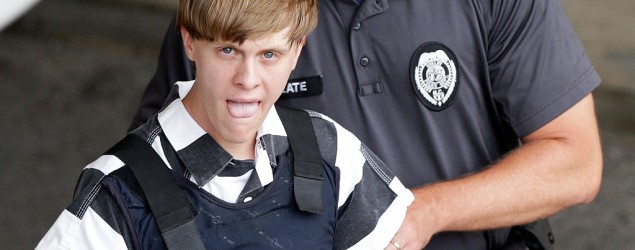-- As Jon Stewart painfully pointed out: "
We won't do jackshit." He's
correct. For Obama's part, he seems to be
tired of talking about the rampant and senseless mass shootings in this country, but he's not offering to actually do anything about it. "Calling upon Congress to enact gun legislation" is limp and toothless. His has been a bullied pulpit in more ways than the
fourteen times he's had to speak about gun violence during his 6-and-one-half years in office.
-- Remember that time John Roberts said there was
not enough racism in the South to need the Voting Rights Act any longer? Yeah, tens of thousands of gun deaths every year across America and and one, sometimes two cases of voter fraud. Which one do we need more laws to protect us from? Particularly in the South, where the GOP is losing elections so badly. Or maybe
New Jersey.
-- The gun nuts are already after
the 'gun-free' zones of South Carolina's churches.
The report that knocks down this asinine 'good guy with gun stops bad guy with gun' horseshit was
recently in the news.
According to the study, gun owners committed 259 justifiable homicides compared to 8,342 criminal homicides in 2012, the most recent year data was available.
That means gun owners are 32 times more likely to kill someone without cause than to act in self-defense, the study reasoned.
“We hope legislators in every state will stop believing the self-defense myth and look at the facts,” says Julia Wyman, executive director of States United to Prevent Gun Violence. “Guns do not make our families or communities safer.”
-- The Confederate flag, which flies over the South Carolina capital of Columbia, will not be lowered to half-staff like the others flying there. Because
it can't be -- it's fixed to the top of the pole -- and because it takes a vote of the legislature to lower it. So despite the
murder of one of its members, that flag is flying higher over the statehouse than the US flag today. And that really says everything you need to know about the South.
-- Republicans are
either demagoguing the issue or
avoiding it altogether. It's not about race, it's not about guns, it's not about thugs or even domestic terrorists when they're white; it's about an
attack on faith. It was
religious persecution that occurred inside the Emanuel African Methodist Episcopal Church. Stay classy, you God-fearing assholes.
-- While all that happened, the US House quickly and quietly passed the fast track trade authorization bill that was
defeated just last week. Last month the Senate did
precisely the same
thing.
Twenty-eight House Democrats pushed it over the finish line in a 218-208 vote.
Here are their names; they include Texans Rubén Hinojosa, Eddie Bernice Johnson, Henry Cuellar, and Beto O'Rourke. Also DNC chair Debbie Wasserman-Schultz.
Another 46 Democrats also voted to repeal a key portion of Obamacare yesterday.
Now do we understand why we can't have nice things in this wonderful country when so many of the alleged left party are actually right-wing?




